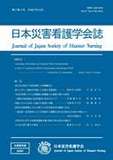Japanese
English
- 有料閲覧
- Abstract 文献概要
- 参考文献 Reference
- サイト内被引用 Cited by
要約
研究目的は福島第一原発事故災害によりC市に避難し、借り上げ住宅に居住する20歳以上のB町町民の健康と生活の実態を明らかにすることである。調査は2012年10月〜2013年9月に行った。住民の健康と生活状況等31項目で構成した質問紙を用い、個別訪問または電話で聞き取り、記述統計を行った。
回答者は509人(21歳〜95歳)、平均年齢54.1±16.44歳であった。避難回数は平均5.4±2.05回であった。高血圧、脂質異常症等が多く、体重増加と食事量、睡眠時間、運動量の減少が顕著であった。8.3%の人がうつ病や不安障害が疑われる状態であった。震災前に比べて無職の人が2.7倍増え、約4割の人が震災の影響で仕事を変えていた。また、近所の人との世間話しやイベントに参加する機会等が減少し社会的交流が乏しくなっていた。避難生活によってライフスタイルや生活習慣が変化し、心身の健康に影響を及ぼしていた。
The aim of this research was to evaluate the health and daily lives of adults evacuated from B Town to kariage jutaku housing (i.e., government-subsidized rental properties) in C City after the Fukushima Daiichi Nuclear Power Plant accident of March 2011. The survey was conducted via home visits or by telephone from October 2012 to September 2013 as part of a process of support provision. It consisted of 31 items involving current health and daily life, and results from 509 people aged 21 to 95 (average: 54.1) were subjected to descriptive statistical analysis. The respondents had moved an average of 5.4 times before settling in kariage jutaku housing.
Hypertension and dyslipidemia were the most common medical conditions. Depression or anxiety was observed among 8.3% of respondents, with other common issues including weight gain, reduced food intake, less sleep and reduced physical activities.
The rate of unemployment was 2.7 times higher than before the disaster, and around 40% of respondents reported having changed jobs since the disaster. There were also fewer opportunities for social interaction with neighbors and participation in town events.
These findings suggest that respondents' physical/mental health and lifestyles had changed for the worse.
Copyright © 2015, Japan Society of Disaster Nursing All rights reserved.


